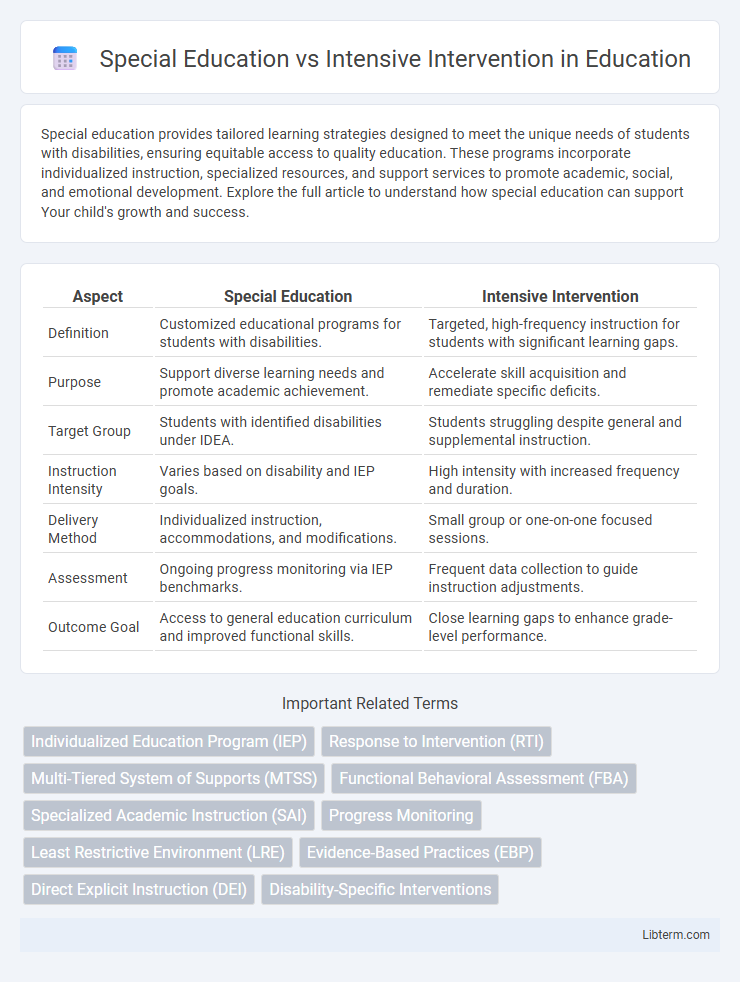Special education provides tailored learning strategies designed to meet the unique needs of students with disabilities, ensuring equitable access to quality education. These programs incorporate individualized instruction, specialized resources, and support services to promote academic, social, and emotional development. Explore the full article to understand how special education can support Your child's growth and success.
Table of Comparison
| Aspect | Special Education | Intensive Intervention |
|---|---|---|
| Definition | Customized educational programs for students with disabilities. | Targeted, high-frequency instruction for students with significant learning gaps. |
| Purpose | Support diverse learning needs and promote academic achievement. | Accelerate skill acquisition and remediate specific deficits. |
| Target Group | Students with identified disabilities under IDEA. | Students struggling despite general and supplemental instruction. |
| Instruction Intensity | Varies based on disability and IEP goals. | High intensity with increased frequency and duration. |
| Delivery Method | Individualized instruction, accommodations, and modifications. | Small group or one-on-one focused sessions. |
| Assessment | Ongoing progress monitoring via IEP benchmarks. | Frequent data collection to guide instruction adjustments. |
| Outcome Goal | Access to general education curriculum and improved functional skills. | Close learning gaps to enhance grade-level performance. |
Understanding Special Education: An Overview
Special education provides tailored instructional services for students with disabilities to support their unique learning needs and promote academic success. It involves individualized education programs (IEPs), specialized teaching strategies, and accommodations designed to address diverse cognitive, emotional, or physical challenges. Intensive intervention, often used within special education, targets specific skill deficits through highly focused, evidence-based techniques to accelerate student progress.
Defining Intensive Intervention in Education
Intensive intervention in education refers to a highly individualized approach designed to address significant academic or behavioral challenges through frequent, targeted instruction. It involves systematic assessment, data-driven decision-making, and tailored strategies that intensify support beyond standard special education services. This method aims to accelerate student progress by adapting instructional methods, increasing instructional time, and providing specialized resources.
Key Differences Between Special Education and Intensive Intervention
Special education provides tailored instructional services designed to meet the diverse needs of students with disabilities, often encompassing a broad range of support including individualized education programs (IEPs). Intensive intervention targets specific skill deficits through frequent, explicit, and systematic teaching aimed at accelerating learning progress for struggling students. Key differences include the scope of support, with special education addressing overall educational needs, while intensive intervention focuses narrowly on remediation of particular academic or behavioral challenges.
Eligibility Criteria for Special Education Services
Eligibility criteria for special education services require documented evidence of a disability that adversely affects a child's educational performance, necessitating specialized instruction under the Individuals with Disabilities Education Act (IDEA). Intensive intervention typically targets students showing significant academic difficulties but not yet qualifying for special education, emphasizing data-driven instruction before formal evaluation. Schools conduct comprehensive evaluations including cognitive, academic, and behavioral assessments to determine if a student meets state-specific criteria for special education eligibility.
When Is Intensive Intervention Appropriate?
Intensive intervention is appropriate when a student shows persistent learning difficulties despite receiving quality instruction and targeted support within general or special education settings. This approach is data-driven, involving frequent progress monitoring to tailor interventions that address specific skill deficits in areas such as reading, math, or behavior. Students requiring intensive intervention often demonstrate significant gaps in achievement that standard special education services alone cannot sufficiently address.
Individualized Education Programs (IEPs) vs. Intensive Intervention Plans
Individualized Education Programs (IEPs) provide a comprehensive framework tailored to a student's unique learning needs in special education, detailing specific goals, accommodations, and services. Intensive Intervention Plans focus on targeted, short-term strategies designed to address significant learning gaps through frequent progress monitoring and data-driven adjustments. Both plans emphasize personalized instruction, but IEPs encompass broader educational objectives while Intensive Intervention Plans concentrate on immediate skill remediation.
Role of Educators and Specialists in Both Approaches
Educators in special education design individualized learning plans tailored to students with disabilities, ensuring access to the general curriculum through accommodations and modifications. Specialists in intensive intervention employ targeted, evidence-based strategies to address specific skill deficits, frequently conducting assessments to monitor progress and adjust instruction. Both roles require collaboration to align instructional methods and support services, maximizing student outcomes through personalized educational approaches.
Outcomes: Measuring Success in Special Education and Intensive Intervention
Outcomes in special education are measured by individualized education program (IEP) progress, academic achievement, and social-emotional development tailored to each student's unique needs. Intensive intervention success is often evaluated through frequent data collection on skill acquisition, behavioral changes, and responsiveness to targeted instruction. Comparing these approaches highlights that special education outcomes emphasize long-term inclusion and independence, while intensive intervention focuses on rapid skill remediation and closing learning gaps.
Parental Involvement and Advocacy
Parental involvement in special education is crucial for effective Individualized Education Program (IEP) development and ensures tailored support for students with disabilities. Intensive intervention demands active advocacy from parents to secure specialized resources and continuous progress monitoring, enhancing educational outcomes. Collaboration between educators and families strengthens communication, empowering parents to influence decision-making and promote their child's academic success.
Integrating Special Education and Intensive Intervention: Best Practices
Integrating special education and intensive intervention involves collaborative planning between educators to tailor evidence-based instructional strategies that address students' unique learning needs and disabilities. Utilizing data-driven decision-making and continuous progress monitoring helps optimize individualized education plans (IEPs) and ensure timely adjustments to intervention intensity. Effective best practices emphasize multidisciplinary teamwork, professional development, and incorporating assistive technology to enhance student engagement and academic outcomes.
Special Education Infographic

 libterm.com
libterm.com